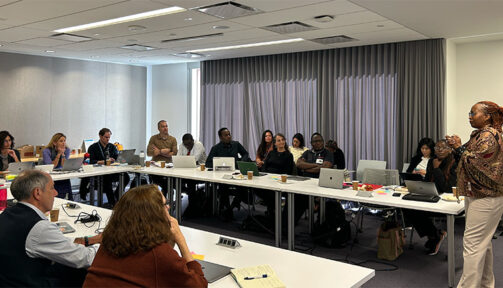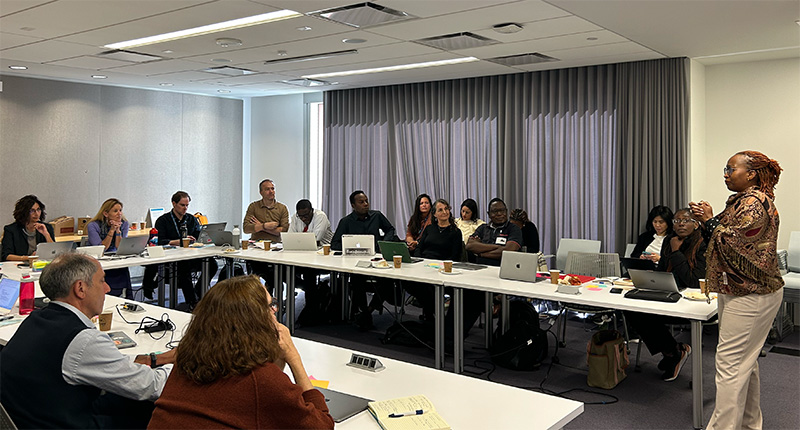DITHub will address global health disparities by bringing together the latest data and technological innovations across IGHS, UCSF and international partners.
More than 25 researchers and data scientists from UCSF, the University of Nairobi and Makerere University gathered on October 16 at UCSF for a weeklong convening to launch the Data, Innovation and Technology Hub. DITHub, for short, will build on UCSF’s mission to advance health worldwide by bringing together people and projects at UCSF and global partners to innovate on precision public health strategies, build robust data pipelines, employ artificial intelligence, and optimize data use. The goal is to accurately identify and address global health threats and disparities through better data use and training.
During the convening, researchers shared progress on their existing collaborations and discussed aspirational initiatives in five distinct categories: clinical quality improvement; epidemiology, public health and surveillance; forecasting and modeling; research, innovation and interventions; and training and capacity building in data science.
DITHub’s first project, ENabling Girls in AI and Growing Expertise in Data Science (ENGAGE), is a partnership between the University of Nairobi (UoN) and IGHS. Its goal is to empower and educate girls and young women to be data scientists and leaders in their communities and public health. ENGAGE’s organizers seek to train over 800 girls and young women over five years. Globally, only 22 percent of artificial intelligence professionals are women.
Julius Oyugi, PhD, is the director of ENGAGE and faculty at the UoN’s Institute of Tropical and Infectious Diseases. He stated, “Our expected outcome is that we will see more women in leadership positions in health data and more women scientists, who will influence public health policy and reduce the current biases.”
ENGAGE will develop a curriculum for three tiers of learning: a beginner tier for secondary school girls, an intermediate tier for STEM diploma holders, and an advanced tier for women in graduate degree programs. Learners in the intermediate and advanced tiers will be paired with mentors and provided with a hands-on learning experience. At each level, the goal will be to empower women to be leaders in data science.
ENGAGE is funded by Takeda Pharmaceuticals’ corporate social responsibility (CSR) Program. Takeda recently announced five new partnerships to its CSR Program, which contribute to strengthening health systems in low- and middle-income countries.
Additionally, #startsmall – Jack Dorsey’s philanthropic initiative to fund global crisis relief, girls’ health and education, and open internet development – has contributed $1 million to scale ENGAGE to other communities throughout East Africa. UCSF will partner with the Infectious Diseases Institute at Makerere University in Uganda to develop advanced data science training programs to address the limited number of women data scientists in public health.
Daudi Jjingo, PhD, is a senior faculty in bioinformatics at Makerere University. His project, SHEDataScience (SHEDS), seeks to train 15 women at the undergraduate, master’s and doctoral levels. IGHS will support curriculum development for ENGAGE and SHEDS and match participants to mentorship opportunities.
“We are very excited for these partnerships, which expand our work in East Africa while leveraging the excellence in data science at UCSF to address the important issue of gender parity in public health data science,” stated Susie Welty, MPH, who is co-director of DITHub along with Fitti Weisglass, MSc, MBA.
DITHub has also received a grant from UCSF’s Office of Research Community-Building Small Grants Program for their proposal, Data Science Community for Health Equity and Global Health. In March 2024, DITHub will co-host a symposium to connect professionals and academics at UCSF and the larger community working in data science and health equity.

